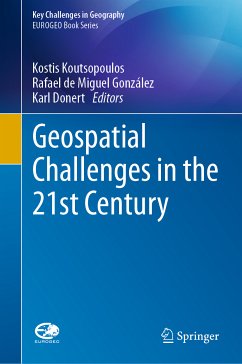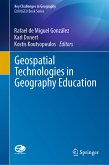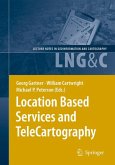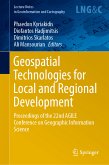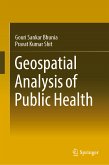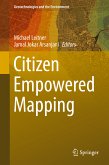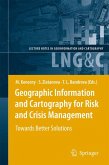Geospatial Challenges in the 21st Century (eBook, PDF)
Redaktion: Koutsopoulos, Kostis; Donert, Karl; de Miguel González, Rafael


Alle Infos zum eBook verschenken

Geospatial Challenges in the 21st Century (eBook, PDF)
Redaktion: Koutsopoulos, Kostis; Donert, Karl; de Miguel González, Rafael
- Format: PDF
- Merkliste
- Auf die Merkliste
- Bewerten Bewerten
- Teilen
- Produkt teilen
- Produkterinnerung
- Produkterinnerung

Hier können Sie sich einloggen

Bitte loggen Sie sich zunächst in Ihr Kundenkonto ein oder registrieren Sie sich bei bücher.de, um das eBook-Abo tolino select nutzen zu können.
This book focuses on 21st century geospatial technologies (GT). It highlights their broad range of capabilities and their essential role in effectively addressing and resolving critical everyday issues, such as environment, sustainability, climate change, urban planning, economy, culture and geopolitics.
Featuring chapters written by leading international scientists, it discusses the application of GT tools and demonstrates that the problems requiring such tools transcend national boundaries, cultures, political systems and scientific backgrounds on a global scale. In addition, it enhances…mehr
- Geräte: PC
- ohne Kopierschutz
- eBook Hilfe
- Größe: 20.99MB
![Geospatial Technologies in Geography Education (eBook, PDF) Geospatial Technologies in Geography Education (eBook, PDF)]() Geospatial Technologies in Geography Education (eBook, PDF)73,95 €
Geospatial Technologies in Geography Education (eBook, PDF)73,95 €![Location Based Services and TeleCartography (eBook, PDF) Location Based Services and TeleCartography (eBook, PDF)]() Location Based Services and TeleCartography (eBook, PDF)161,95 €
Location Based Services and TeleCartography (eBook, PDF)161,95 €![Geospatial Technologies for Local and Regional Development (eBook, PDF) Geospatial Technologies for Local and Regional Development (eBook, PDF)]() Geospatial Technologies for Local and Regional Development (eBook, PDF)113,95 €
Geospatial Technologies for Local and Regional Development (eBook, PDF)113,95 €![Geospatial Analysis of Public Health (eBook, PDF) Geospatial Analysis of Public Health (eBook, PDF)]() Gouri Sankar BhuniaGeospatial Analysis of Public Health (eBook, PDF)113,95 €
Gouri Sankar BhuniaGeospatial Analysis of Public Health (eBook, PDF)113,95 €![Citizen Empowered Mapping (eBook, PDF) Citizen Empowered Mapping (eBook, PDF)]() Citizen Empowered Mapping (eBook, PDF)89,95 €
Citizen Empowered Mapping (eBook, PDF)89,95 €![Mathematics for Earth Science and Geography (eBook, PDF) Mathematics for Earth Science and Geography (eBook, PDF)]() Cyril FleurantMathematics for Earth Science and Geography (eBook, PDF)48,95 €
Cyril FleurantMathematics for Earth Science and Geography (eBook, PDF)48,95 €![Geographic Information and Cartography for Risk and Crisis Management (eBook, PDF) Geographic Information and Cartography for Risk and Crisis Management (eBook, PDF)]() Geographic Information and Cartography for Risk and Crisis Management (eBook, PDF)113,95 €
Geographic Information and Cartography for Risk and Crisis Management (eBook, PDF)113,95 €-
-
-
Featuring chapters written by leading international scientists, it discusses the application of GT tools and demonstrates that the problems requiring such tools transcend national boundaries, cultures, political systems and scientific backgrounds on a global scale. In addition, it enhances readers' spatial understanding of, and geographical reasoning in connection with, societal issues.
The book will appeal to scientists, teachers and students of geography, the earth sciences and related areas, as well as decision-makers interested in the application and capabilities of geospatial technologies and new, spatial methods for addressing important issues.
Dieser Download kann aus rechtlichen Gründen nur mit Rechnungsadresse in A, B, BG, CY, CZ, D, DK, EW, E, FIN, F, GR, HR, H, IRL, I, LT, L, LR, M, NL, PL, P, R, S, SLO, SK ausgeliefert werden.
- Produktdetails
- Verlag: Springer International Publishing
- Seitenzahl: 429
- Erscheinungstermin: 16. Januar 2019
- Englisch
- ISBN-13: 9783030047504
- Artikelnr.: 54955256
- Verlag: Springer International Publishing
- Seitenzahl: 429
- Erscheinungstermin: 16. Januar 2019
- Englisch
- ISBN-13: 9783030047504
- Artikelnr.: 54955256
- Herstellerkennzeichnung Die Herstellerinformationen sind derzeit nicht verfügbar.
